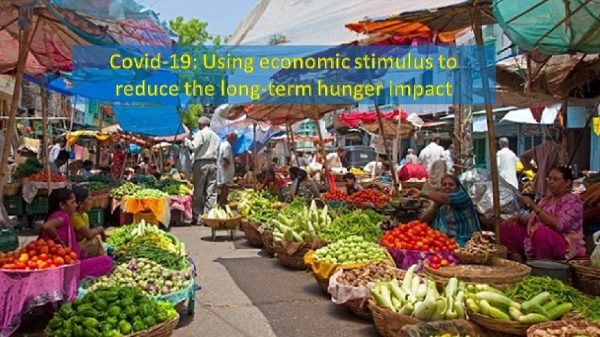
COVID-19: Using economic stimulus to reduce the long-term hunger impact
New FAO (Food And Agriculture Organization, UN) Policy Brief analyzes pandemic-driven recession’s threat to global hunger levels
Beyond the COVID-19 health emergency, a recession looms, and countries ought to take measures now to soften the longer-term impacts on hunger and food insecurity, a new FAO policy brief says.
Forecasts for the global economy vary in detail, but all point to a historic downturn. The International Monetary Fund now expects worldwide gross domestic product to shrink by 3.0 percent in 2020, compared to January projections of 3.3 percent growth. The large downturn is also expected to usher in the first outright recession in sub-Saharan Africa – where about a quarter of the population is undernourished – in 25 years.
In the 2019 State of Food Security and Nutrition in the World (SOFI) report, FAO analysts noted that economic slowdowns and downturns helped explain rising undernourishment levels in 65 of the 77 countries that recorded such rises between 2011 and 2017. That underscores the risk of adverse hunger trends ahead.
The new FAO Policy Brief offers an analysis of food supply data since 1995, which is linked to FAO’s statistical development of the prevalence of undernourishment (PoU) indicator and correlates them to past local economic trends in countries that are net food importers.
It notes that in the absence of timely and effective policies, millions of people are likely to join the ranks of the hungry as a result of the COVID-19-triggered recession. That number will vary according to the severity of economic contractions, ranging from 14.4 million to 38.2 million people, or even 80.3 million should there be a truly devastating contraction of 10 percentage points in all 101 net food-importing countries’ GDP growth.
The Policy Brief warns that the actual outcome could be worse if current inequalities in access to food are worsened. It includes scenarios and methodology and a technical note was developed and published simultaneously to explain those aspects in further detail.
“The Policy Brief offers evidence in favor of making hunger reduction a priority of the economic stimulus measures to address COVID-19,” says Marco V. Sánchez, Deputy-Director of FAO’s Agricultural Development Economics Division.
Safeguarding trade and food supply chains and promoting social protection to ensure food access
As the world is not facing food shortages, FAO is urging that countries do their best to keep trade flowing and food supply chains alive and increase agricultural output during the international health crisis. The large-scale fiscal and monetary responses that governments are crafting to respond to the expected blow to economic growth, represent an opportunity to tackle the longstanding issues in many middle and low-income countries of inequality in accessing healthy food.
Cash and in-kind transfers, new credit lines for key actors in food systems, safety nets, income support, distribution programmes such as food banks, and continuing school-feeding delivery, should be directed to the most vulnerable and poorest people. Such targeting, the brief enjoins, will also maximize the effect that public resource outlays have on keeping demand more dynamic and safeguarding people from falling into chronically weak dependencies that can last for years.
There are encouraging examples of “stimulus for food” initiatives in low and middle-income countries – at least 106 countries have introduced or adapted social protection measures in light of the COVID-19 pandemic, according to a real-time review of social protection policy measures from the World Bank and the International Labor Organization – although the ability of African countries to deploy cash transfers has so far been weak.
International cooperation and assistance is needed to help the poorest and most vulnerable countries, and this can be linked to recipient countries reallocating more of their own resources to achieve the desired objectives and avoiding the highly adverse outcome of increased inequality in access to food.
Targeting public stimulus measures towards initiatives to bolster food access during the pandemic also offers an opportunity to build more lasting resilience into food systems to safeguard them against economic slowdowns and downturns in the future.
News published in : Food and Agriculture Organizations of United Nations http://www.fao.org/
Author: HealthyLife | Posted on: July 30, 2020
« Must know Home Remedies During Quarantine And Lockdown Mexico Bans Glyphosate Herbicide »






















Write a comment